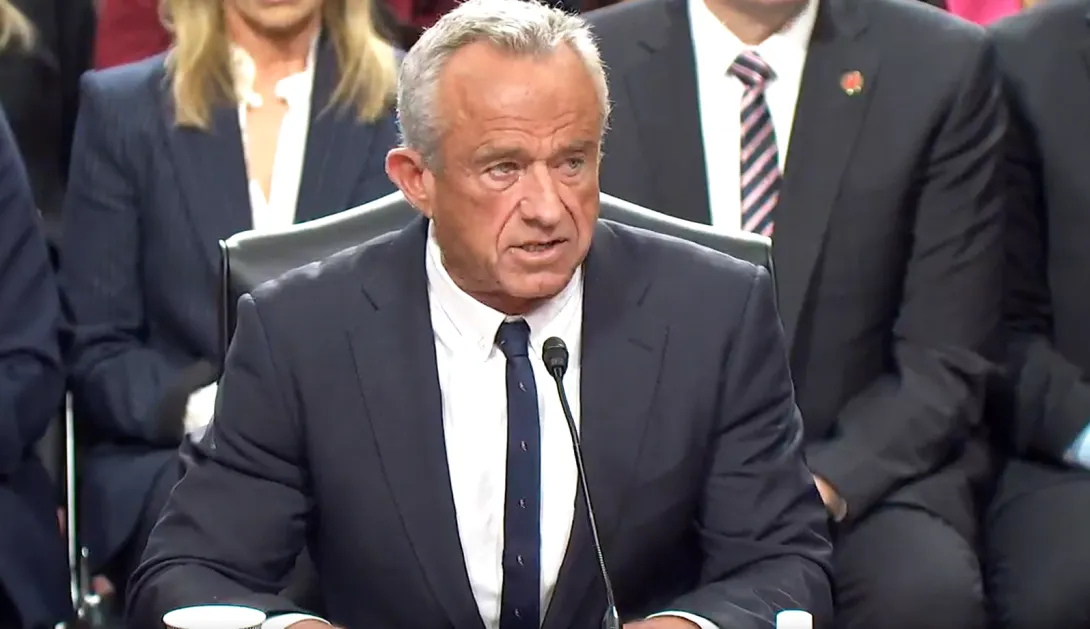
HHS Secretary Robert F. Kennedy Jr. speaks before the Senate Finance Committee earlier this year.
Photo: Senate Finance Committee screen shot
The Trump administration has rescinded July 2022 guidance that allowed physicians to perform emergency abortions.
On Tuesday, the Department of Health and Human Services and Centers for Medicare and Medicaid Services rescinded the Biden administration guidance on "Reinforcement of EMTALA Obligations specific to Patients who are Pregnant or are Experiencing Pregnancy Loss."
EMTALA is the Emergency Medical Treatment and Active Labor Act that was passed by Congress in 1986.
In July 2022, then HHS Secretary Xavier Becerra wrote to healthcare providers to give guidance about the enforcement of EMTALA and allowable emergency procedures after the Supreme Court overturned a person's right to an abortion in siding with Mississippi Department of Health Officer Thomas E. Dobbs in Dobbs v. Jackson Women's Health Organization.
"As frontline healthcare providers, the federal EMTALA statute protects your clinical judgment and the action that you take to provide stabilizing medical treatment to your pregnant patients, regardless of the restrictions in the state where you practice," Becerra wrote.
"Emergency medical conditions involving pregnant patients may include, but are not limited to, ectopic pregnancy, complications of pregnancy loss, or emergent hypertensive disorders, such as preeclampsia with severe features. Any state laws or mandates that employ a more restrictive definition of an emergency medical condition are preempted by the EMTALA statute."
Stabilizing treatment could include medical and or surgical interventions such as abortion, removal of one of both fallopian tubes, anti-hypertensive therapy and more, irrespective of any state laws or mandates, Becerra said.
"Thus, if a physician believes that a pregnant patient presenting at an emergency department, including certain labor and delivery departments, is experiencing an emergency medical condition as defined by EMTALA, and that abortion is the stabilizing treatment necessary to resolve that condition, the physician must provide that treatment. And when a state law prohibits abortion and does not include an exception for the life and health of the pregnant person – or draws the exception more narrowly than EMTALA's emergency medical condition definition – that state law is preempted."
"Rescinded" is stamped across the document.
WHY THIS MATTERS
CMS gives no specifics on what providers should do when faced with an emergency situation in which a physician deems abortion as the necessary stabilizing treatment.
"CMS will continue to enforce EMTALA, which protects all individuals who present to a hospital emergency department seeking examination or treatment, including for identified emergency medical conditions that place the health of a pregnant woman or her unborn child in serious jeopardy," CMS said. "CMS will work to rectify any perceived legal confusion and instability created by the former administration's actions."
Becerra's letter and its reinforcement of EMTALA obligations does not reflect the policy of this administration, CMS said.
Since Roe v. Wade was overturned, decisions have been left up to individual states. Physicians have voiced concern over what procedures they can legally perform.
THE LARGER TREND
In September 2022, a Sermo survey of more than 460 physicians uncovered a lot of uncertainty about the legality of performing an emergency abortion. Almost three-quarters of physicians, 74%, said they were unclear over what constituted a life-threatening emergency that would allow a doctor to legally perform an abortion in states where it is otherwise banned.
Eighty-four percent of respondents worried that doctors were being asked to wait until the very last minute when it was clear that a patient would die, before they perform an abortion. Another 84% said abortion bans make it a felony to provide or attempt to provide an abortion – meaning doctors and clinics would be the ones likely to be charged and tried, rather than individual patients.
Email the writer: SMorse@himss.org